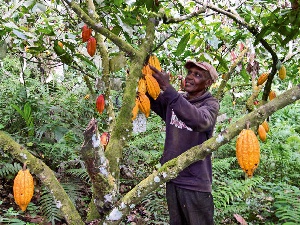Nestle is in partnership with Ghana Cocoa Board (Cocobod) to train the country’s cocoa farmers in best agricultural practices.
The partnership, dubbed “Nestle Cocoa Action Plan”, will be targetted at training farmers on how to increase yields, reduce disease, respect the environment and produce a better quality crop to attract higher prices.
It is to ensure long-term benefits for thefarmers, the government and other stakeholders in the cocoa industry.
Ms. Sandra Martinez, Head of Nestlé’s Confectionery Business, said: “The Nestle Cocoa Action Plan was made up of a productivity package that consisted of training, new planting materials and fertilisers as well as a community development package focused on education, gender parity and child labour.
“Our ambition is to prevent and eliminate all forms of child labour from our supply chain, while respecting family situations and the legitimate need for rural development.
“In Ghana we will work closely with Cocobod and CRIG (Cocoa Research Institute Ghana) to transfer our technology, which has recently become a Research Centre for Cocoa serving the whole of West Africa. This demonstrates the enormous socio-economic benefit that regional integration can bring.”
Ms.Martinez said the plan forms part of Nestlé’sCreating Shared Value (CSV), which is a corporate social responsibility of the company, as cocoa beans are the key ingredient used for their products.
The Nestle Cocoa Action Plan will ensure that farmers run profitable farms through the sharing of technology and training in best practices. This will promote growing of quality cocoa in a sustainable way and increase the yield.
She observed that farmer premiums are relatively linked to production and yield, but in the country the Cocobod regulates the range for premiums so that farmers do not lose out significantly during low yield seasons, adding that “Nestlé pays one of the highest premiums to cocoa farmers in the country”.
“This is what we call ‘Creating Shared Value,” meaning that while we are creating a stronger business for the future, going beyond sustainability; we also help to create value for the communities where we operate,” Ms Martinez said.
“Nestle’s CSV is not for charity; therefore the business need for securing a quality supply of cocoa grown in accordance with its principles will continue to drive it.”
It will evolve over time as they learn from experience and discover new issues and opportunities. Long-term partnerships have been developed in countries where the plan is currently being run.
Nestle, as part of the programme, has trained over 9,000 farmers in major cocoa-producing countries including Ghana to help increase their yields as part of its CSV, which aims at buying at least 80,000 tonnes of cocoa beans per year from these farmers, Ms Martinez stated.
The Nestle Cocoa Action Plan is a global programme with commitment to invest worldwide, including in Ghana, a total of 110 million Swiss Francs in the next 10 years.
This investment includes facilities and capacity building and also aims at distributing 12 million high-potential cocoa seedlings in the first 10 years of the programme.
The initiative, according to Ms. Martinez, will hinge on three pillars -- which are enabling farmers to run profitable farms through farmer training; higher yielding cocoa farm; and rewarding farmers for good quality cocoa.
Nestlé and its partner Cocobod will map out more cocoa growing areas for training of farmers, school building projects, women’s empowerment in cocoa growing areas, and other interventions which fall under Nestlé’s Global framework.
The second pillar, she said, is aimed at improving social conditions by eliminating child labour and focusing on women and children and their specific needs for education, health and water.
The third pillar is sourcing for sustainable good quality cocoa through long-term supply, transparency in the supply chain, and environmental responsibility.
Ms. Martinez said Nestle, together with another 11 cocoa/chocolate companies, have partnered other organisations such as the Fair Labour Association, World Cocoa Foundation, International Cocoa Initiative, UTZ Certified, in one of the largest sustainability programmes for coffee, cocoa and tea in the world as part of an effort to work together toward a truly sustainable cocoa industry.
“Within the Cocoa Action Framework, Nestle will be sharing learning and best practices in this domain with the objective to achieve scale and more speed,” she said.
Click to view details



Business News of Sunday, 22 June 2014
Source: BFT

















